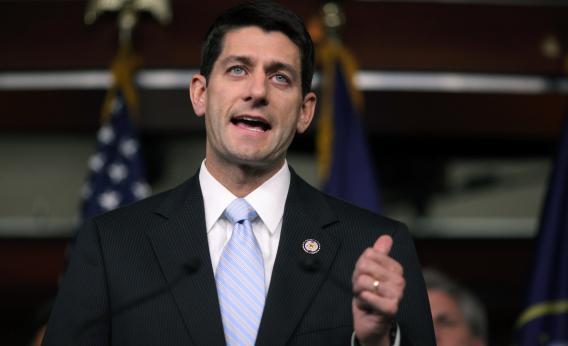The text of Paul Ryan’s big Stanford speech is out. Pay special attention to the section about the politics of his budget.
All but four Republican members of the House – and all but five Republican members of the Senate – voted for our Path to Prosperity budget – Medicare reforms and all. And, though we took a few dings at first, we survived.
The Democrats’ tried the same old scare tactics for a few months, and in the first special election that took place after our budget passed, we learned a costly lesson. We learned that unless we back up our ideas with courage, and defend them in the face of attacks, we will lose.
Hm. This isn’t how I remember NY-26. Jane Corwin, the Republican candidate, was very clear: She supported the Ryan plan, and blind opposition to the plan was the same as rooting for Medicare to collapse. “It’s not like you’re given a certain of money to go out and you have to shop around,” she told me at the time. “The plans are defined. And how much gets paid is based on your wealth and your wellness, so if you’re sick or you’re lower income you receive more than someone who’s wealthy.” The non-“courageous” thing, maybe, was attacking Democrat Kathy Hochul for Medicare cuts, when the Ryan budget also assumes the cuts. I don’t think that’s what Ryan is talking about.
But once we learned that lesson and started to get our message out… well, a funny thing happened: People listened. They learned that our plan did not affect those in or near retirement; that it guaranteed coverage options like the ones members of Congress enjoy; and that choice and competition would drive costs down and quality up. They also learned more about the Democrats’ plans for Medicare, and they didn’t like what they heard.
And the scare tactics stopped working.
Look at what just happened earlier this month in the recent special elections next door in Nevada and out in New York. The Democrats threw every scare tactic they could think of at the Republican candidates running in two special elections for vacant House seats. But the attacks failed to connect with voters hungry for solutions. The Republican candidates prevailed.
Is that what happened? In Nevada, sure. Democrat Kate Marshall tried to make Republican Mark Amodei suffer for the Ryan plan.
But in New York, Republican Bob Turner didn’t actually support the Ryan plan. Turner’s backers accused Democrats of lying about the candidate because, hey, even they admitted that Medicare would be changed somehow. The Ryan plan was neutralized as an issue. This isn’t great evidence for Ryan’s point that starting to privatize Medicare will no longer hurt Republicans.
